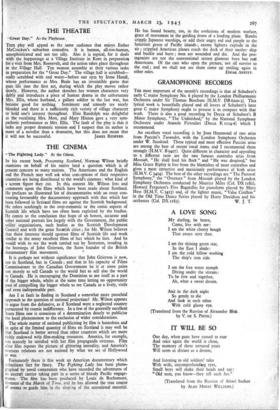THE THEATRE
Tins play will appeal to the same audience that enjoys Esther McCracken's suburban comedies. It is human, all-too-human, unsophisticated and not too silly. Also it is topical, for it deals with the happenings- at a Village Institute in Kent in preparation for a visit from Mrs. Roosevelt, and the action takes place throughout in the Village Hall. Ten women assemble at their various tasks in preparation for the "Great Day." The village hall is scrubbed— really scrubbed with real water—before our eyes by Irene Handl, whose performance as Mrs. Beale has an irresistible gusto that puts life into the first act, during which the play moves rather slowly. However, the author sketches her women characters very deftly and introduces a piece of human drama in the unfortunate Mrs. Ellis, whose husband, a gallant soldier in the last war, has become good for nothing. ' Sentiment and comedy are nicely blended and there is a sufficiently rich variety of village character to hold one's interest throughout. Elsie Randolph was delightful as the vocalising Mrs. Mott, and Mary Hinton gave a very sym- pathetic performance as Mrs. Ellis. The fault of the play is that it lacks any proper dramatic tension and I suspect that its author is more of a novelist than a dramatist, but this does not mean that


























 Previous page
Previous page